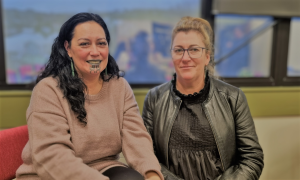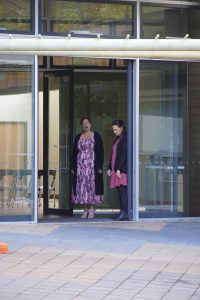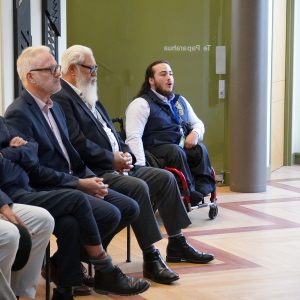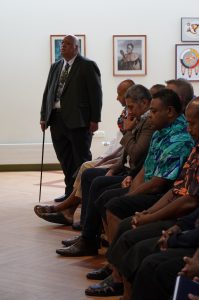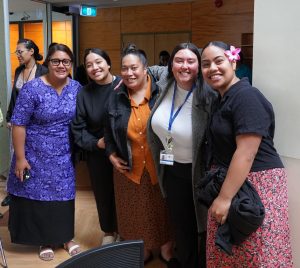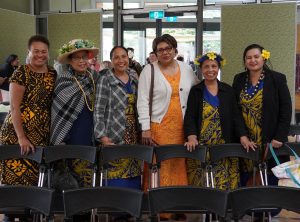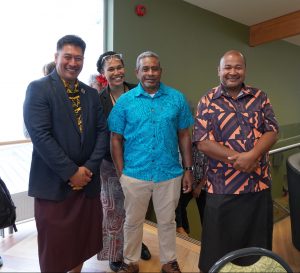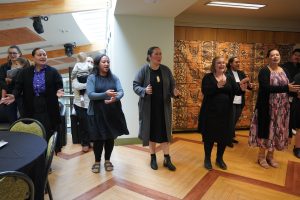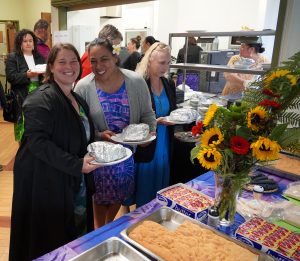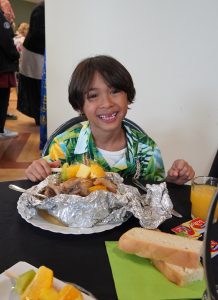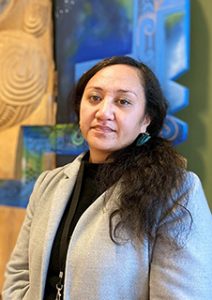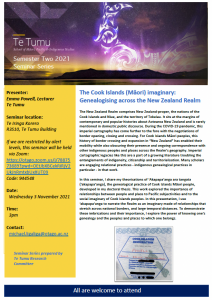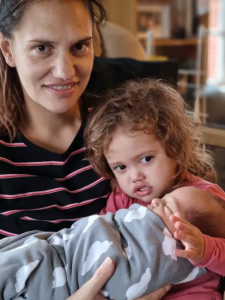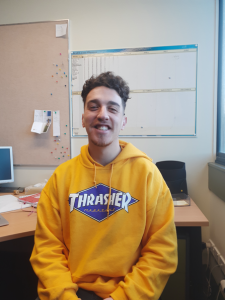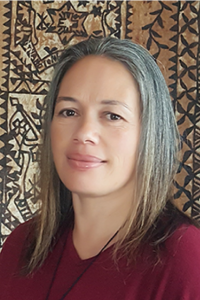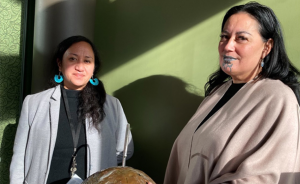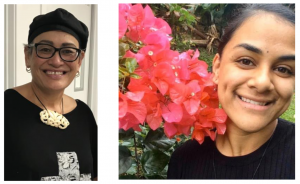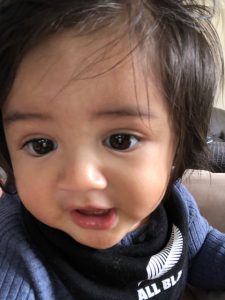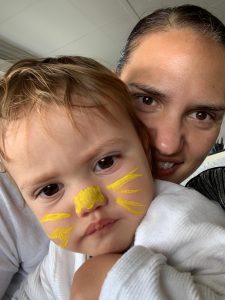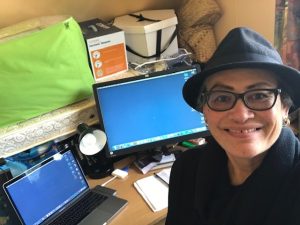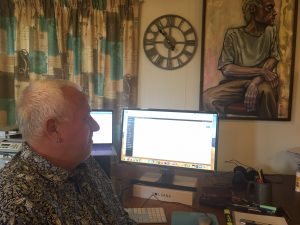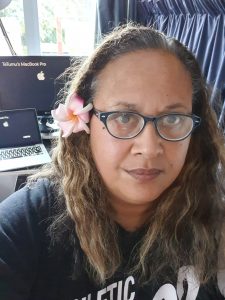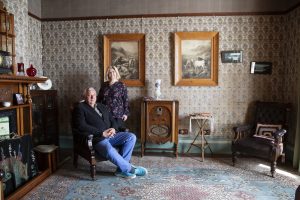“Reinstating Mana Whenua narratives back on the whenua”: Te Tumu Seminar series guest Megan Potiki
In a thought-provoking and timely session given the ongoing celebrations of Matariki, Kāi Tahu and Te Ātiawa academic Megan Potiki presented as part of the 2023 Te Tumu Seminar Series on Wednesday this week. Her talk centred around the work of creating mana whenua narratives for various building and development sites around the city and the wider Ōtakou region. This includes work for puna kaukau, the police station, the hospital, George St, the university re-brand, Auahi Ora – Union, and Tunnel Beach. She’s also been part of the Te Rangihīroa student accommodation build in collaboration with Ngāti Mutunga of Taranaki.
Megan’s characteristic humour and honesty about the process of creating these narratives was both refreshing and profound. She stressed the importance of “getting it right with your own people”, being able to own your mistakes, and putting in the work to finding multiple credible sources. It’s also important to know when to give, when to take people with you and when to push for change. There is both privilege and responsibility that comes with being able to grow up living and learning from your own whenua and also for those who return to their roots.
Ultimately, Megan’s talk high-lighted the importance of bringing to life stories that are deeply rooted in the knowledge, practices and people of this whenua. The process of writing a narrative is complex, requiring a lot of research, collaboration, and hard work particularly when collaborating with your own hāpu. Names have power, and reinstating the mana associated with those names is vital in redressing some of the mamae caused by colonisation, and also celebrating the wealth and wisdom of generations that have come before us.
Early career Cook Island researchers shine at the Pacific Islands Universities Network Conference 2023 ki Rarotonga
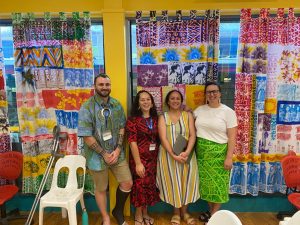
L-R: Cook Islands scholars Liam Koka’ua, Inano Taripo Walter, Dr Emma Powell, Stacey Koka’ua Balfour
Dr Emma Powell writes about her recent trip to Rarotonga for the 2023 Pacific Islands Universities Network Conference.
Established in 2012, the Pacific Islands Universities Network (PIURN) Conference was intended to “enable closer and meaningful collaboration” amongst a consortium of 14 universities located in the island-Pacific. Rarotonga was chosen as the location for the networks 5th meeting and several doctoral students and Otago staff travelled to the Cook Islands to participate in the regional conference on 4-6 July 2023.
Dr Emma Powell arranged a special session for Cook Islands early career researchers on 6 July local time. Inspired by the arrangement of a festschrift for Cook Islands scholar and educator, the late Dr Marjorie Crocombe, during the conference, the session was intended to honour an pioneering generation of scholars, many of whom were mentored by Dr Crocombe, and signal new turns in Cook Islands scholarship from a swelling critical mass of new Cook Islands researchers.
Inano Taripo Walter, who is a Cook Islands doctoral candidate with secondary supervision at Te Tumu, presented on the role of va‘ine Māori within the land court. She discussed the importance of piri‘anga (relationships), ‘akapapa‘anga (genealogies) and mana to understanding the significance of women in the arbitration of ‘enua (land) within Cook Islands society. Stacey Kokaua, a Cook Islands doctoral candidate in Otago’s English department, presented her early stages of research into Cook Islands Māori theoretical responses to ecocriticsm within literary studies. Liam Kokaua, a graduate of the University of Auckland’s Masters of Indigenous Studies programme, shared compelling research he’d undertaken about the pae maunga on Rarotonga. Liam has produced material for screen and a book that makes accessible ancient and new knowledge about tupuna maunga in the Cook Islands.
The session was well-attended by other Cook Islands and Pacific delegates. The Q&A session was engaging and the panel received an overwhelming number of questions and comments that showed enthuasism both for their respective projects and the wider project of Cook Islands scholarship.
Unexpectedly and with sadness, the session seemed even more poignant with the surprise passing of legendary Cook Islands scholar, musician, writer and public servant, Professor Jon Jonassen, on the first day of the PIURN Conference. Professor Jonassen was widely acknowledged as an expert on Cook Islands peu Māori (cultural traditions), tua ta‘ito (ancients stories) and the Cook Islands drumming tradition. His passing during the conference was a shock to many attending and was felt sharply during the session.
Acknowledgements must also go to Univeristy of Otago colleagues who presented at the conference: Dr Moira Fortin Cornejo (Languages and Cultures) and Dr Jesse Kokaua & Dr Troy Ruhe (Va‘a o Tautai). Dr Powell also presented at the festschrift session for Dr Crocombe where she spoke to a brief paper titled: “That we may be proud of our heritage”, Marjorie Crocombe & Pacific Literature.
Tikaka in action
Tēnā rā koutou, Ni sa bula vinaka, Mālō e lelei, Talofa lava, Kia orana, Fakaalofa lahi atu.
On Friday 24 February Te Tumu welcomed two new staff members, Professor Patrick Vakaoti who is our new Dean and member of the Pacific Islands Studies team, and Dr Wahineata Smith, who is joining our Māori Studies team. A pōwhiri was held at Te Tumu following the tikaka o Kāi Tahu, the mana whenua. We are lucky to have Kare Tipa as one of our staff members who can guide us through the kawa. A big mihi too to everyone involved in the organisation of the event, especially the rika wera from the Office of Māori Development who served the delicious hāngī for lunch. After lunch there was an opportunity for people to informally speak on behalf of the two new staff. Te Tumu staff also presented a koha to Dr Emma Powell, who has just started her maternity leave.
Patrick is a well seasoned sociologist with an interest in Pacific youth, both those who are marginalised and disaffected, but also youth leadership and civic engagement. Currently, he is contemplating research that critically looks at the interface between the University and the aspirations of indigenous students, academics and the community.
Wahineata was once a student at Te Tumu, starting 21 years ago. She completed her PhD at AUT, and is returning to research after being part of the university’s schools liaison team. She is contemplating undertaking research in into families with dual and multiple ethnicities, including aspects of identity and mental wellbeing and the choice of the language[s] in their homes.
We are very lucky to have these two new additions to our staff.
Below are photos, courtesy of Keilah Fox, and Jess Pasisi. Click on images to enlarge.
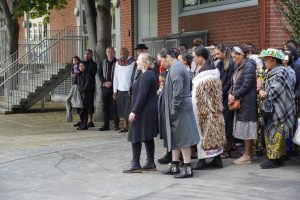
Rauhina Scott-Fyfe responded to the call as kaikaraka for the manuhiri. Wahineata Smith is adorned with the korowai.
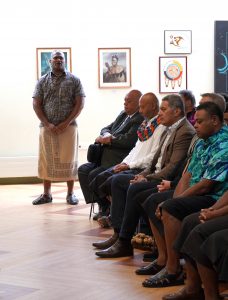
It was great to hear the Fijian language was used within the tikaka of the pōwhiri. Eric Nabalagi spoke on behalf of Patrick.
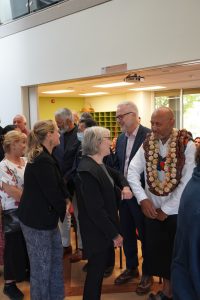
Due to Covid precautions, the elbow bump was utilised in place of the customary hongi. In the foreground, Patrick Vakaoti and Allison Finnegan bump elbows.
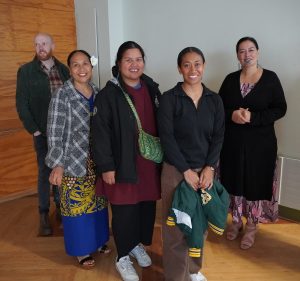
Centre front, Finau Taungapeau (PTO), Tamete Teweti (PIC) and friend. Left flank: Neil Vallelly; right flank, Kare Tipa.
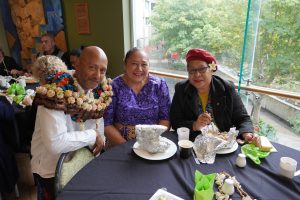
Patrick Vakaoti converses with Telesia Kalavite, the Coordinator of Pacific Islands Studies, and Tofilau Nina Kilifi-Alai, Otago’s Pacific Community Engagement Manager in Auckland.
Dunedin Cook Islands Research
It’s always great when undergraduate students get an opportunity to undertake research. This summer, Dr Emma Powell of Indigenous Studies had two young students helping with her look at the history and experiences of Cook Islanders in Dunedin as part of the ‘Akapapa’anga nо̄ te iti tangata project.
The following is an account from one of the students, Tiare Makanesi.
At the beginning of 2022, Emma Samuels and I had the privilege of working alongside Emma Powell on ‘Akapapa’anga nо̄ te iti tangata: Stories from the Cook Islands Community in Dunedin. With this project, we learnt more about the Cook Islands community in Dunedin and the journeys of our community from the Cook Islands to New Zealand. From finding Cook Islands dance troupes in the early 60s to learning about the Uki Tamariki Ou Cook Islands childcare centre that was set up in the early 2000s in Corstorphine, we gained a better understanding of our culture and how significant it is to the culture of Dunedin.

Anja Matapo, with the research students for the ‘Akapapa‘anga nō te iti tangata project, Emma Samuels and Tiare Makanesi.
We spent most of our time scouring through an array of archives to create a foundation of knowledge to prepare us for our on-going community work. The Hocken was our most used archive where, with past papers and microfilm, we discovered many stories that captured beautiful Cook Islands values and parts of our culture.
One article that I believe expresses the importance of our ui tupuna (ancestors) was an ODT piece from 1993. Emma’s pāpā (grandfather) was interviewed during a study about why the majority of rest home residents are European. Pāpā Puka attributed living with his children as a common tradition practised throughout Polynesia. This custom shows how we treasure and continue learning from their puna (springs) of knowledge. We look after them as they did us. This article reminded us of how important it is to respect and care for those that raised us.
Another article that we came across was about a community leader, Pāpā Kōpu Rouvi, and his involvement within the Dunedin Cook Islands community since 1966! Papa Kopu served the community when bringing Cook Islanders from the Islands to Dunedin, supporting those that needed advice. He became a role model that recently arrived Cook Islanders could confide in. This year was the second year anniversary of his passing and Emma and I organised a gift for his family on behalf of the Otago University Cook Islands Students’ Association. The support and guidance he gave University students over the years was irreplaceable and we wanted to show our appreciation.
Emma’s part in this project has included project managing the Cook Islands’ community’s (Te Vaka Cook Islands of Dunedin Inc.) oral history project, funded by the Ministry of Culture and Heritage. Her time has been spent upskilling and organising so that the community can complete this project to deadlines and to the standards expected by the funder. Thoughtful communication, the importance of a plan B and taking that extra step for refinement are all things Emma has learnt and put into practice. Emma said this project was more than just researching for her. It was a special insight into a community that she loved being a part of. She has focused on organising an oral history workshop for the community with oral historian, Helen Frizzell, and others at the National Library, and she created an adjusted budget and plan for the project following the award in late 2021.
For Emma and I, it has been an extremely rewarding experience to delve deep into the histories of our Cook Islands community here in Dunedin. Although we are Dunedin-born and raised, we hadn’t grown up involved in Cook Islands events. This project has helped us reconnect with our culture in so many ways. We now have a wealth of knowledge and a kete (basket) of ideas to continue enriching the community through the Otago Cook Islands Students’ Association. The difficulty of uncovering this knowledge also inspired us to amend our association’s constitution to donate to the ephemera collection at the Hocken Archives every year. This will be a growing legacy of our footprints as Cook Islands students here at Otago University.
Emma and I are thankful for this opportunity to dig through the archives as we never would have without encouragement. We were rewarded with evidence of sports teams, church functions and cultural programmes throughout the archive. Not only was I fortunate enough to learn about my cultural heritage but also my family’s history. I am now more aware of my language, culture and how my grandparents experienced life when they arrived here. That was my favourite part of this project. It has allowed us to build strong connections within the community which is important when finding our identity. It really has helped us discover what it truly means to be a Cook Islander here in Dunedin.
We have the deepest gratitude for Te Vaka and Emma Powell for putting their faith in us to execute this research. We have gained many skills and experiences during our work and appreciate the responsibility given to us. We would like to thank Te Tumu and the University of Otago for allowing us to take a break from our supermarket jobs and fully immerse ourselves in such a rewarding “job”.
Meitaki ma’ata,
Tiare Makanesi.
The Cook Islands (Māori) Imaginary…
Dr Emma Powell is one of Te Tumu’s newest staff members, a member of our Indigenous Development team who will also be teaching INGS501 next year, the core paper for the Master of Indigenous Studies degree that investigates Indigenous methods and theories.
Emma will be presenting our next seminar, on “The Cook Islands (Māori) Imaginary: Genealogising across the New Zealand Realm” starting 3pm, 3 November. If we are back at Level 1, this will be in Te Tumu, otherwise click here to connect via Zoom. Code: 944548.
Please click on the poster below the abstract of Emma’s talk. Everyone is welcome to attend.
What’s been going on?
There haven’t been too many blogs in the last six months but that will change, with more news coming through as it happens. But to clear the decks, this is a roundup of research news since December. As indicated in the last round-up, Te Tumu was going through a lot of changes with a number of staff retiring or heading off to greener pastures. Since then, even more have moved on; with Tangiwai Rewi also leaving to join Poia in Wellington, and take up a role with the Ministry of Education. But we are really happy that Tangiwai and Gianna Leoni are maintaining links with Te Tumu as affiliate researchers.
Lachy Paterson came back from RSL (Research and Study Leave) at the start of June, and Michael Reilly has just started his year of RSL from 1 July. RSL is an opportunity to engage more deeply with research without the usual demands of teaching and administration, although with Covid, any overseas travel is now impossible. We also won’t be seeing Karyn Paringatai for some time as well. Congratulations to Karyn and Neihana on the birth of Mātahi, a little brother for Manuhou. Karyn is enjoying maternity leave at present, and this will be followed by her scheduled RSL.
We have been lucky to have three new academic staff join us, which is helping to fill the gaps left by our departing staff. Paia Taani joined the Māori Studies team at the start of the year, and was joined more recently by Kare Tipa; both are teaching te reo Māori papers. In addition, Emma Powell joined the Indigenous Development team, and among other things, will be teaching the INGS 501, the core paper in the Master of Indigenous Studies programme next year.
In addition, we have four teaching fellows also helping out, and now occupying the second floor: Leighton Williams (MAOR110: Conversational Māori); Kahurangi Tīpene (MAOR208: Ngā Manu Taki); Val Houkamau (MAOR102: Māori Society); as well as Julia Wilson organising the logistics for Te Tumu’s module in POPH192: Population Health.
And to help facilitate our various research projects, Jade Higgan McCaughan is working as a research assistant for Te Tumu staff. Jade is a former MIndS student, and staff are already making bookings to access his time and expertise.
Paia Taani.
Since beginning my lecturing position in January I have been focusing on three main kaupapa; teaching, confirmation and my PhD. The kaupapa for my doctoral research is about tracking intergenerational transmission of te reo Māori within my own whānau. Whānau narratives of their experiences and perspectives of te reo Māori will form the foundation of my thesis to address the question: How can whānau experiences of te reo Māori loss and, where applicable, reclamation, influence future intergenerational transmission of te reo Māori?
My application for a PhD Doctoral Support Grant from Ngā Pae o te Māramatanga was successful and this also includes ongoing support through fortnightly Zoom hui with other postgraduate tauira from around the motu and to listen to guest speakers. During these hui, tauira will have the opportunity to present their research to the group, so I am looking forward to doing this in September. I will also be presenting at Te Wānaka Rakahau – Ākoka/Student Research Symposium which is held at the University of Otago at the end of August.
Paerau Warbrick
Paerau has completed two articles this year. One has just been published in the June 2021 Journal of New Zealand Studies and is called ‘Māori Election Petitions of the 1870s: Microcosms of Dynamic Māori and Pākehā Political Forces’. Click on the link to read it.
The other is called ‘Price of Citizenship for Māori. A matter of historical and legal context’. The article is to appear in a special upcoming edition of the Journal of the Australia and New Zealand Legal History Society which is now called law&history. The focus of the article tracks the legal concept of citizenship for Māori from pre European contact through to the late 1940s.
Currently, Paerau is working on two further articles. One is on the monumental election battles in 1884, 1887 and 1890 over the Eastern Māori seat in Parliament between James Carroll and Wi Pere. Paerau is analysing individual polling booth data to explain the factors of how Carroll managed to unseat Wi Pere in 1887 and maintain the seat in the 1890 election.
The other article is a commentary on New Zealand’s most senior Māori politician, Winston Peters (former deputy PM and long time Māori MP). The article emphasises that Winston Peters must first and foremost be analysed in terms of him being Māori. He is not a person who is to be analysed in terms of him having ‘Māori ancestry’ or ‘Scottish ancestry’. Peters’ world view is totally in line with his Māori world view. And this is the key to understanding the man and his political positions over time.
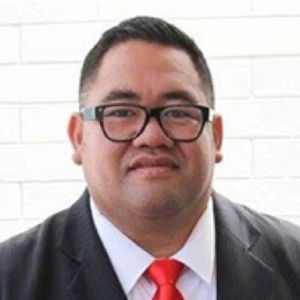 Vaivaimalemalo Michael Ligaliga
Vaivaimalemalo Michael Ligaliga
Michael has been busy recently as Expert Panellist for Royal Commission of Inquiry into Abuse in State and Church Care, Auckland NZ. “I am currently preparing to provide expert advice and on the potential use of indigenous redress practices as a solution to providing closure, voice, reconciliation for victims of abuse. Furthermore, I have been asked to provide a discussion around the advantages and disadvantages of indigenous reconciliation processes such as Samoa’s ifoga, Fiji’s isorosoro, Hawaii’s Hoooponopono, and Tonga’s Fakalelei. How do we apply these reconciliation processes in Aotearoa New Zealand?”
He has also been engaging with the Asia Pacific Institute for Gender-Based Violence (API-GBV) in California, USA. “API-GBV approached me to translate the Power and Control Wheel. The wheel is globally used to identify the different types of violence and abuse. I have been working on translating the Power and Control Wheel into the Samoan language. In addition to this, I have been participating in online zoom listening sessions with GBV and domestic violence service providers, researchers, and government agencies discussing the application of the Power and Control Wheel in the Samoan space. It is intended that after these discussions, a new violence model for Samoan communities will be developed and introduced.”
Lachy Paterson.
The RSL time has been mostly engaged in the Te Hau Kāinga: Māori Home Front project looking at Māori experiences in New Zealand during the Second World War. We have a fairly large team undertaking research, which will eventually end up in a book. Have a look at the “stories” we are posting to our website as we go, which gives a flavour to some of the stuff we are finding out. There are some interesting stories there.
One of the great things about this projects is that we were fortunate to employ six Māori students on Summer scholarships (two of which were part-funded with Humanities Māori Summer Scholarships), supervised by Angela Wanhalla and Miranda Johnson of the History programme, and Erica Newman and myself from Te Tumu. Leighton Williams and Val Houkamau are Te Tumu students; Talia Ellison is a Te Tumu graduate, now doing a Master of Peace and Conflict Studies; Zoe Thomas is majoring in History, with a minor in Indigenous Development; and Bethany Waugh is an Anthropology student. We had one non-Otago student, Rebecca Lee Ammunson from Waikato, studying History, English, and te reo Māori. Check out their projects and research reports.
Part of Angela’s and my work has been to discuss the project and build relationships, and I have met with archivists and librarians at Pukekohe Library, Archives New Zealand, Canterbury Museum, Christchurch City Library and Auckland Museum, Hokianga Museum, Te Ahu (Far North Museum), and the curators of Te Kōngahu Museum of Waitangi and Te Rau Aroha Museum on the Waitangi Treaty Grounds. Angela Wanhalla and I also presented a Zoom seminar on the project to the programme of the La Trobe University History programme, looking at some ongoing aspects of Māori life during the war, namely religious activities, as well as petitions and protests over past grievances.
My other project was to further a book I am writing on a history of Māori-language print culture. I was lucky to be invited to give a key note on Māori-language newspapers to the Bibliographical Society of Australia and New Zealand Conference held in Adelaide late last year. Of course my hopes of being there in person were scuppered by Covid, so instead I gave the talk by Zoom, which was recorded and put on Youtube.
Emma Powell and Kare Tipa were featured in the Uni News. Read about here. Kare has been active in promoting the use of te reo Māori me ōna tikanga, with Hui Whakatau held every Monday morning at 8.30 in Te Tumu. Come along!
Emma Powell
Before beginning in my new role at Te Tumu, my research work was focused on the submission of my PhD. That work – ‘Akapapa‘anga ara tangata: Genealogising the (Cook Islands) Māori imaginary – was a highly abstract and theoretical engagement with the genealogical practices of my people. I described those practices in three modes: cultural practice, cultural paradigm and research method. In those modalities, I then discussed various contemporary political and cultural issues that have surfaced in public discourse over the last decade. Many parts of my PhD have inspired the seeds for new projects that I will begin here at the University of Otago.
The first is a piece of work about the genealogical, cultural and constitutional imbrications of the New Zealand Realm with a particular focus on the Cook Islands. The idea of the New Zealand Realm, with its many (and relatively unresearched) parts, lends itself well to collaborative projects. I recently co-edited an article about the New Zealand Realm and, along with colleagues from the University of Auckland, University of Waikato, Massey University, AUT and Lousiana State University, we have submitted it for publication. I also presented early ideas about the problems of the Realm’s constitutional geography with Miranda Johnson (in the History programme at the University of Otago) at the Empire & Ecologies: Transimperial, transhistorical and transregional natures from the 17th to the 21st century symposium, hosted by University College Dublin.
Alongside teaching in the coming months, I will be working on turning my PhD into a book and hope to organise a workshop where I can invite colleagues and mentors to workshop the manuscript with me. I also look forward to collaborating with Erica Newman on a writing project, and meeting with graduate students and colleagues from the University of Waikato and AUT in preparation for conference season, November to December 2021.
Erica Newman has had two MIndS students successfully complete with distinctions, who will be graduating this year. She reports:
“I gave a presentation for the sixth annual CCARHT (Cambridge Centre for Applied Research in Human Trafficking) Summer Symposium on the 29th June. My presentation was titled ‘Māori patterns of adoption’ where I discussed the differences between whāngai and the introduced European laws of adoption. The latter were established for the adoptive parents, and as the adoptee has no say, and the 1955 Adoption Law severed connections between all parties, this can be seen as a legal practice of trafficking babies. Something that would not happen (that I have not been aware of) within te ao Māori.
“As a result of that symposium I am currently working on an article for the Journal of Modern Slavery. I am also working on several other articles, and blog posts for the Te Hau Kāinga: Māori Home Front project.
“At the moment my main focus is on my Marsden project, and Te Hau Kainga Marsden project. As part of my Marsden I made a trip to Christchurch to Oranga Tamariki Adoption Services head office where I met with a number of Adoption Practice Managers, Practice Leaders, Regional Service Managers, Policy Law/Reform staff and Ministry of Justice Law Adoption Reform team leader. My visit was to introduce myself and my research project and to discuss the effects of the current adoption legislation for descendants of Māori adoptees. This proved to be a very positive meeting which allowed me to gain an insight to their perspectives and to make them aware of issues from a descendant’s point of view. This has given rise to a ongoing relationship, where I now have contacts within the adoption services whom I can contact if I need clarity on anything for myself and for the collaborators on this research project.
“As part of this project, I went to Wellington a couple of weeks ago and had a follow up meeting with Ministry of Justice where we discussed the new Adoption Law Reform Discussion document. This included looking at all the different aspects of the current 1955 Adoption Law and how this could be changed, even discussing whether we needed an adoption law moving forward. They asked me lots of questions from my point of view as a descendant of a Māori adoptee as well as from my research findings.
“Whilst in Wellington I also met with MP Paul Eagle (Labour) who is a Māori adoptee himself and very focused on the law reform. We discussed my research and different aspects of adoption especially for Māori.
“Oranga Tamariki Adoption Services have asked me if I would agree to being interviewed and filmed to discuss my story as a descendant of a Māori adoptee.”
—
Well, that’s all for now. Expect more news soon.
Seminar: He Matapihi ki te Ao Tuupuna
Te Tumu’s Research Committee is pleased to announce the resumption of its seminar series on Wednesday 20 May 2020, 2-3pm [NZ Time] with Dr Tangiwai Rewi and Taamirangi Sam-Turner presenting. This research has emerged out of Tangiwai’s PhD, with Taamirangi researching the topic, on how to engage people in conducting their own whānau research, as a summer intern through Ngā Pae o te Māramatanga. For more details, see the Seminar Poster- Rewi & Sam-Turner (1)
The presentation will be blingual (English and te reo Māori). All interested people are most welcome, including Te Tumu’s postgraduate students.
To attend, click here for the Zoom link; the password is 868657.
Te Tumu Research Under Lockdown
The Lockdown has proved hugely disruptive to all Te Tumu staff, impacting on all aspects of our academic lives, including research. We now move from Lockdown to Level 3 – which so far doesn’t look too much different for us. Despite this, we have still been managing to keep our research productivity going, hopefully with some “outputs” in the offing.
To find out a little bit more, I sent out a request to staff to send in a few details on the highs and lows of their research during lockdown.
First, let’s talk about some of the problems. Some staff talked of getting “zui’d out”, i.e. too many Zoom hui. There’s been some research on how tiring Zoom meetings can be, and what with teaching online, staff and school meetings, supervision get-togethers, and other hui, it can seem like some days we are constantly on Zoom. Then there’s the extra effort preparing for online teaching, especially in the reo classes where you need to convert the quick-flowing quick-changing interactive tasks into online teaching activities.
Then there are the events that have been cancelled or deferred, such as Poia Rewi’s Māori language symposium that he had planned with the Government Department Collective, and Michelle Schaaf’s planned delivery of Summary Report for ‘Childhood in a Changing Pacific’: Samoa and Dunedin to Pacific communities in Samoa and Dunedin. Lachy Paterson had also been planning to kick off his upcoming research and Study Leave (RSL)with a couple of conferences in France, but these have both been cancelled.
Then there’s working from home. Three of our staff have young children also locked down with them, which creates its own complications. As Karyn says, she has also been “researching meal plans for a fussy eater and activities to keep a 13 month old entertained” – hard work when “food still refuses to get eaten and suggested activities don’t keep her attention for longer than 5 minutes!!” And one person complained (was it a complaint?) that “My new office space is far too close to the pantry”.
So if those were the lows, what were the highs?
Poia says he is pleased that Gianna Leoni and Tangiwai Rewi have come on board the Te Reo Me Ngā Tikanga Māori Platform for 2020 research, looking at the impacts of research by researchers under Ngā Pae o te Māramatanga. Gianna is also feeling chuffed that she has finished a research proposal she had been needing to do for a few months – and having it accepted.
Tangiwai, as Chair of the Te Tumu Research Committee, also organised a “Hot Tips” Zoom session with staff earlier this month, on how to enhance their applications for University of Otago Research Grants (UORGs). We were really pleased to have the ebullient Humanities Associate Dean (Research), James Maclaurin there to share his knowledge with us.
Both Lachy and Tangiwai are on RSL next semester, so have been revising their travel, and research and writing plans, which has been difficult given that no one knows how long we will be in Level 3, or when normality will return.
Lachy has been organising getting the proofs and indexing for a new edited collection on Indigneous textual cultures, which will hopefully be out in September. See here for more info. He been working on the Te Hau Kāinga/Māori Home Front project, including translating the blog posts. If you haven’t read the latest ones (in English or Māori) then check them out at the project website. You can also listen to him and Angela Wanhalla promoting the project on Radio New Zealand’s Saturday Morning programme on Anzac Day: Lachy has also been asked to submit an abstract for a chapter on Māori newspapers in The Edinburgh Companion to British Colonial Periodicals.
Michelle has been busy transcribing interviews, sorting participants’ diaries and personal papers collected during her recent RSL, in preparation for UORG application. She is also part of a team who have just completed the Summary Report for Childhood in a Changing Pacific: Samoa and Dunedin. She has also been chosen to write a chapter for an e-book for Bridget Williams Books on “’Thesis Survivor Stories”, to be published in June.
Megan Pōtiki is busy on finishing her thesis. She recently published “Te hū o Moho: The call of the extinct Moho: The death of the Māori language at Ōtākou” which appeared in the latest issue of Te Pouhere Kōrero.
Lyn Carter has completed a journal article during the Lockdown, which she has sent off to a Sami journal. Otherwise, she says, she has been having lots of Zoom meetings with various research clusters around climate change and health/climate change and environment, including on her National Science Challenge projects, Building Better Homes, Towns and Cities, and BioHeritage.
Building on her publishing success from last year, Telesia Kalavite, is currently writing a journal article for the New Zealand Journal of Educational Studies. She is also one of the principal applicants for a successful grant application for Humanities Research Network with an amount of $10,000 for 2 years. The name of the project is: “Pacific Thought Network (PacTNetwork)”. Telesia is now developing an application for UORG grant to further her research.
Our newest staff member, Vaivaimalemalo Michael Ligaliga, has been very busy. He has been developing a book proposal for Palgrave Macmillan based on his PhD thesis, as well as a UORG application. Michael has also been working on a chapter on the Samoan perspective on addressing domestic or family violence for the Handbook of Positive Peace , and another for Decolonizing Indigenous Research Methodologies in Peace and Conflict Research.
Michael Reilly has been continuing his work, writing chapters about Māui Pōtiki, one on a Ruapuke Island narrative, and another looking at two stories by Mohi Ruatapu. His aim is to incorporate these chapters into a book about Maori tribal traditions, perhaps with Auckland University Press, building on the kind of topics he has taught in his MAOR207 and INDV307. Michael has also been asked to contribute a chapter on emotions in the Pacific and Australia for an edited book, The Routledge Modern History of Emotions.
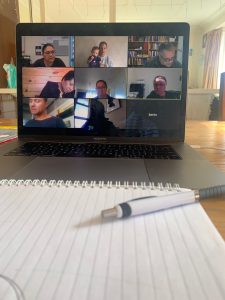
Perpetual hui on Zoom! Here Karyn and Manuhou are attending a board meeting for Te Rūnanga Māori of Ako Aotearoa.
The Lockdown has disrupted Karyn’s Marsden research, so she’s been busy working on a new plan, and catching up on some of her reading. She has recently been published by Lancet Oncology. This came from an invitation to her and her collaborators to the International Gastric Cancer Linkage Consortium in Wānaka last year to share their research on updating the international practice guidelines for Hereditary Diffuse Gastric Cancer. Karyn is currently working on the final draft of a book chapter she is co-writing with Marcelle Wharerau (ex-Te Tumu student, now teaching at Waikato University) on subversive pedagogies entitled, “Tūngia ki te marae, tau ana – culturally transformative learning in universities”.
Paerau Warbrick was enjoying his RSL when the Lockdown was imposed, focusing his research on historic Māori elections, and the lawsuits that often went with them. He has just finished a draft article on the 1876 Eastern Maori election petition involving Hēnare Pōtae, Rōpata Wahawaha and Karaitaina Takamoana and the 1887 Northern Maori election petition involving Hirini Taiwhanga and Wī Kātene. Paerau is also working on an article on the monumental election battles between Wī Pere and James Carroll in the 1884, 1887 and 1890 elections, and making the finishing touches to another article regarding the UK Supreme Court and how it should take lessons from the NZ Court of Appeal Maori Council case of 1987 and the Foreshore and Seabed case of 2003.
Wherever you are, I hope you are all staying safe and keeping well, and being productive with your research (if that’s your thing).
Te Hau Kāinga features in He Kitenga
This year’s issue of He Kitenga is out, in which the University of Otago highlights some of its funded research. The Marsden-funded Te Hau Kāinga: The Māori Home Front, led by Associate Professor Angela Wanhalla (History) and Professor Lachy Paterson (Te Tumu) is one of the features. To read the online version of the article, click here.
Te Tumu Seminar
Talofa lava.
Our new Pacific Islands Studies lecturer, Vaivaimalemalo Dr Michael Ligaliga will be presenting Te Tumu’s first Research Seminar for 2019 tomorrow afternoon 3pm, 29th of March. Michael’s topic is Fa’a Samoa: Peacebuilder or Peacebreaker: Understanding the Domestic Violence Problem in Samoa: A Peace and Conflict Perspective. The seminar will be in Te Paparewa, on the ground floor of Te Tumu, and is open to all interested people.
Click on Seminar Poster- Michael Ligaliga to find out more. Feel free to distribute to your networks.

